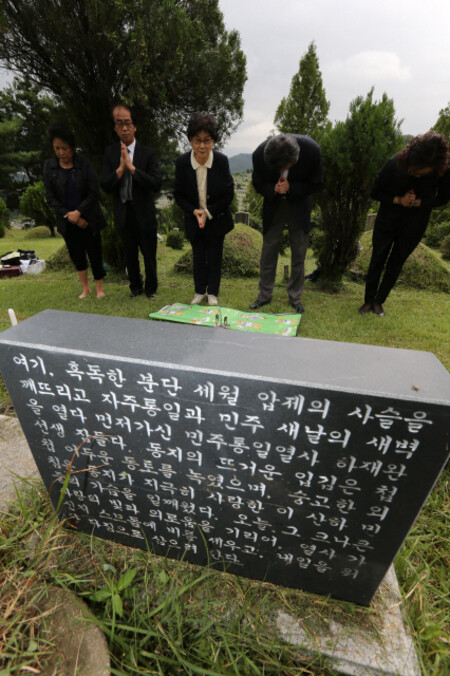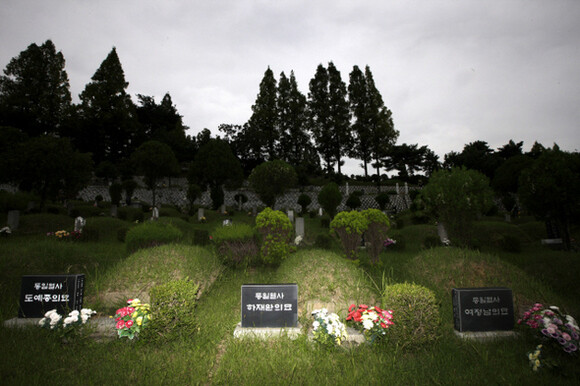hankyoreh
Links to other country sites 다른 나라 사이트 링크
PRP victims’ families ask Park Geun-hye not to play games with words

By Yoon Hyung-joon and Heo Seung, staff reporters
On Sept. 15, families of eight men who were executed on suspicion of being involved in the People’s Revolution Party (PRP) Incident, gathered at a cemetery in Chilgok, North Gyeongsang province. Four out of the eight members who were sentenced to death in 1975 are buried in the second area of Hyundae Cemetery Park. Though the rest are buried in their hometowns, the families have traditionally gathered here. “They passed away for the same reason on the same day, so we pay respects together,” said the families.
Portraits of the 8 deceased were put in front of Ha Jae-wan’s grave. The families paid respect by piling up food and alcohol and burning incense. “This is the first time in five years I’ve felt so down coming here,” said Lee Young-kyo with a stiff face. Lee is wife of the deceased Ha.
It seemed as if all the pain the families had to overcome was vindicated when Seoul Central District Court ruled that the eight men were indeed innocent on January 2007. “Not only my family but also my relatives were blamed and persecuted by many people for years. Nothing can change the past, but after the innocent verdict, I didn’t want anything else.”
Since the ruling, “The atmosphere was much lighter amongst the families of the eight men,” when paying respect together each Chuseok (Korea’s harvest festival), said Lee.
But remarks made by Park Geun-hye, the presidential candidate of New Frontier Party (NFP), on a radio program “Son Suk-Hee’s Spotlight,” has opened up the scars of the bereaved families again. Lee said, “After listening to Park’s remarks, I am afraid that they might return the country to the Yushin Regime. My old memories are coming back.”
“My eldest son transferred schools 3 times since the incident.” In 1974, the year Ha was arrested, his eldest son was a freshman in high school. News articles with the photos of the accused in an organizational chart were posted on the bulletin board behind the classrooms.
“The school must have posted those pictures for security reasons, but my son was bullied as a ‘commie’s so’ by his classmates. He often got into fights with his classmates.” Lee had to move houses 8 times. Wherever she went, she could not escape from the police’s radar or her neighbors’ distrust.
Another bereaved family member, Yeo Gyu-hwan, brother of the deceased Yeo Jeong-nam, had to undergo hardships whenever there were anti-government movements. “I was detained for investigation for 4 days when there was arson at the U.S. Culture Center (1983).” Yeo, 58, had nothing to do with the arson. “I wasn’t a criminal, but I was the subject of suspicion at times of political unrest.”
There was an incident where all of the eight families were investigated due to a term written on the gravestone. “We couldn’t even inscribe the word ‘Democratization Activist,’ because we were afraid that we might be punished. So we just wrote ‘D.A.’” But even that was too much. Families of the eight men were called for an overnight investigation and the gravestone was removed.

After that, the graves had no stones for the next 20 years, an insult that came after death. It was only in 1995, two years after Kim Young-sam’s civilian government came into power, that civil groups erected a tombstone for the deceased. It reads: “Today, in honor of their great light of love and righteousness (…) we are willing to take an oath for the future.”
Park Geun-hye, stated that she would “Visit the bereaved families, if they agreed.” The families gathered at the cemetery shook their heads in disbelief.
“The punishment from the PRP Incident is passed down, even to our children,” said Song Cheol-wan, the son of deceased Song Sang-jin. Song, 58 years old, criticized that the daughter is just like her father. “She’s playing with words, talking about consolation and not making an apology. If she were in our shoes, she wouldn’t dare say that.”
Translated by Yoo Hey-rim, Hankyoreh English intern
Please direct questions or comments to [english@hani.co.kr]

Editorial・opinion
![[Editorial] Yoon must halt procurement of SM-3 interceptor missiles [Editorial] Yoon must halt procurement of SM-3 interceptor missiles](https://flexible.img.hani.co.kr/flexible/normal/500/300/imgdb/child/2024/0501/17145495551605_1717145495195344.jpg) [Editorial] Yoon must halt procurement of SM-3 interceptor missiles
[Editorial] Yoon must halt procurement of SM-3 interceptor missiles![[Guest essay] Maybe Korea’s rapid population decline is an opportunity, not a crisis [Guest essay] Maybe Korea’s rapid population decline is an opportunity, not a crisis](https://flexible.img.hani.co.kr/flexible/normal/500/300/imgdb/original/2024/0430/9417144634983596.jpg) [Guest essay] Maybe Korea’s rapid population decline is an opportunity, not a crisis
[Guest essay] Maybe Korea’s rapid population decline is an opportunity, not a crisis- [Column] Can Yoon steer diplomacy with Russia, China back on track?
- [Column] Season 2 of special prosecutor probe may be coming to Korea soon
- [Column] Park Geun-hye déjà vu in Yoon Suk-yeol
- [Editorial] New weight of N. Korea’s nuclear threats makes dialogue all the more urgent
- [Guest essay] The real reason Korea’s new right wants to dub Rhee a founding father
- [Column] ‘Choson’: Is it time we start referring to N. Korea in its own terms?
- [Editorial] Japan’s rewriting of history with Korea has gone too far
- [Column] The president’s questionable capacity for dialogue
Most viewed articles
- 1Months and months of overdue wages are pushing migrant workers in Korea into debt
- 2[Editorial] Yoon must halt procurement of SM-3 interceptor missiles
- 3Trump asks why US would defend Korea, hints at hiking Seoul’s defense cost burden
- 4[Guest essay] Maybe Korea’s rapid population decline is an opportunity, not a crisis
- 5At heart of West’s handwringing over Chinese ‘overcapacity,’ a battle to lead key future industries
- 61 in 3 S. Korean security experts support nuclear armament, CSIS finds
- 7Fruitless Yoon-Lee summit inflames partisan tensions in Korea
- 8First meeting between Yoon, Lee in 2 years ends without compromise or agreement
- 9[Column] Park Geun-hye déjà vu in Yoon Suk-yeol
- 10South Korea officially an aged society just 17 years after becoming aging society